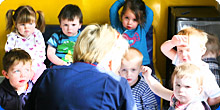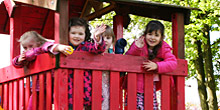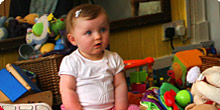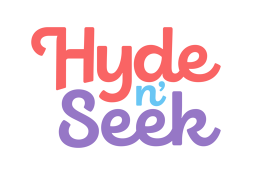Curriculum
Pre-Birth to Three
Pre-Birth to Three – providing positive outcomes for Scotland’s Children and Families. It supports the principles and values of government policy and sets a learning continuum linking to the Curriculum for Excellence and the four capacities for learning. The framework identifies the importance and influence that pregnancy and the child’s first three years of life have in their development and learning.
Brain development conceptualises the four key principles of the Pre-Birth to three, which are interrelated and interdependent. Although the rights of the Child were acknowledged in the previous guidelines, ‘Birth to three – supporting our youngest children’ its importance and recognition needed to be more explicit in linking to the United Nations Convention on the Rights of the Child. Within these key principles, nine features of learning have been identified to assist in putting them into practice; Role of Staff, Attachment, Transitions, Observation, Assessment and planning, Partnership working, Health & Well being, Literacy & Numeracy, Environments and Play.
At Hyde n Seek Nursery we strive to embrace the principles of the Birth to Three Curriculum, Supporting our youngest children, here are some the ways we incorporate it into our service.
Relationships
Settling in period, key worker system, ample opportunities to interact closely with staff and other children, promote security and continuity of care, respect and treat all children and families as individuals, low staff turnover and staff based in rooms stays the same.
Respect
Staff are aware of and embrace diversity, respect children’s individual circumstances and experiences, Staff are knowledgeable about children’s and relevant legislation, staff are knowledgeable about child protection procedures, Staff encompass the principles of the National Care Standards, learning centred as much as possible round children’s interests, children’s choice is promoted throughout the day, Staff listen to children and talk to them even if they cant talk back they can still communicate, staff promote independence as much as possible.
Responsive Care
Staff plan activities responsively to children’s interests or developmental needs, staff are aware of children individually including their personalities, characteristics and routines, personal learning plans available, staff work with other professionals where appropriate, staff value each child’s abilities and achievements and build on this in future learning experiences, each child has an achievement profile, staff are tuned into children’s needs and feelings, meaningful interactions.
Role of Staff
As society is changing, so too is the remit of staff, we share ideas and pool our resources to ensure the child is actively involved in shaping their own learning journey – at their own pace. We have improved the consultation and communication process with both children and their parents/carers by providing monthly newsletters and daily reports via e-mail at their request.
Attachment
An effective keyworker attachment is displayed when a child quickly becomes absorbed in exploration and is easily soothed when upset. To ensure consistency for this child during the transition period of the child moving to another playroom, the keyworker would move with her group. As John Bowlby (Theorist) suggests that for the first three years of life, the pattern of attachment should remain the same adult (keyworker), this has become practice for transitions within the service. The Prebirth to Three Guidance discusses ‘attunement’ where adults are tuned-in to the signals and cues of the child and responds appropriately, keyworkers reflect this within the service.
Transitions
Change is difficult for many children and adults, but it can also be the beginning of something new and rewarding. External changes in education have brought about internal changes to our service. Management and staff have worked collaboratively to implement a system that demonstrates positive benefits for children. We ensure any changes, including those within the family and homes are discussed and the child is supported. Transitions are communicated effectively, positively and meaningful. Staff recognise the importance of managing change in this manner, taking account of the child’s needs, views and involving them and their parents in the process.
Observation, Assessment and planning
‘Assessment should be planned so that it is an integral part of the learning and an evolving process, not an end result’ LTScotland,
Throughout the service we use the concept of the principles of the CfE to determine each learning outcome has ABC – it has Application, Breadth and Challenge. We also reflect the strategies to build resilience, promote problem solving and thinking skills. Plans are individual and reactive according to the needs of the child.
Partnership working
Parents, carers and families are the most important influence on outcomes for children; We encourage all Parents to contribute to planning and assessment, as a collaborative approach to decision making and involving their child. This is an effective process of learning for the child. Within this we use the Home Links – Travelling teddy’s, Big Cook, Little Cook, Art & Craft and Science resources to assist Parents in this process.
Health and Well being
Within the UNCRC and Children’s Charter, they set out the wider rights of all children, including the preventative health care and intervention as appropriate. We use health promotion strategies to ensure staff, parents and agencies work together for improvement in well-being. We use the nutritional guidelines set by Scottish executive to promote a balance diet and both the curriculum frameworks outline what experiences and outcomes will be offered to support children’s learning.
Literacy and numeracy
Communication is more than spoken words, and through stories songs and rhymes it becomes a basis for future learning and development. It is said that early language is a reflection of the language the child hears, and we believe that ‘Adults shape the speech of children by reinforcing the babbling.’ Literacy and numeracy is promoted throughout the service, in every area and in every task the child completes.
Environments
The environment plays a key role in supporting and extending the child’s development and learning. All Hyde n seek nurseries provide rich and varied environments that build children’s confidence to explore and learn in safe, secure yet challenging indoor and outdoor spaces. Children are encouraged to experience nature and the wider world in outdoor play through the Eco Schools programme. Resources for both indoors and outside.
Play
There is a strong link between young children’s learning through play and the impact in later life. Staff/Keyworkers assist children to use the knowledge they have to extend and build on their ideas, concepts and skills, within opportunities to learn through play. While playing, children try things out, solve problems and are creative, they can take risks and use trial and error to find things out about the world around them.
Curriculum For Excellence
“The experiences and outcomes are a major milestone in the development of the Curriculum for Excellence and build on the proud tradition of Scottish education” Fiona Hyslop MSP, Curriculum Review, May 2009
The Curriculum For Excellence has provided the Scottish education system with a long awaited overhaul to fit in with our ever changing worlds and prepare our children for the Scotland of the future. The Curriculum For Excellence aims to ensure children in Scotland will become, Successful Learners, Confident Individuals, Responsible Citizens, and Effective Contributors. The Curriculum is available for children from three to eighteen years, right through their whole education. The experiences and outcomes staff are required to provide range across eight areas, Language and Literacy, Health and Wellbeing, Maths and Numeracy,Expressive Arts, Religious and Moral, Sciences, Social Studies, and Technologies.
The Curriculum For Excellence centres around children as learners and aims to provide a broad, coherent, curriculum that provides challenge and enjoyment for children as well as offering progression and breadth. Staff at Hyde n Seek use this document to enhance the children’s experiences and learning throughout their time at nursery. The nursery embraces the values and principles of the curriculum through children’s planning meetings, big book planners, children’s committees, children’s questionnaires on the nursery in general, active learning, mind mapping. These strategies allow children to think for themselves and take forward their own learning helping them to become Successful Learners, Confident Individuals, Responsible Citizens, and Effective Contributors.
Principles of the Curriculum for Excellence
Taken together, the values, purposes and principles of the Curriculum for excellence will imply changes and developments that provide higher standards of achievement with a clearer focus on the purposes of learning activities. This will lead the child onto broader choices as they progress through school and an easier transition from one level to the next. We complete assessments which promote learning, recognise different types of achievements and promote scope for more enjoyment in learning. Parents will have a clear understanding of the learning opportunities their child will have and ways in which they can support their children’s learning.
Challenge and enjoyment
Staff will use curriculum experiences to provide learning that is challenging, engaging and motivating. The curriculum encourages high aspirations and ambitions for all. Children will be active in their learning and have opportunities to develop and demonstrate their creativity. Staff will provide support to enable children to sustain their effort.
Breadth
All Children will be provided with opportunities for a broad, suitably-weighted range of experiences. The curriculum is organised so that they will learn and develop through a variety of contexts within both the playroom and outdoor environment.
Progression
Children will experience continuous progression in their learning from 3 to 18 within a single curriculum framework. Each stage will build upon earlier knowledge and achievements.
Depth
There should be opportunities for young people to develop their full capacity for different types of thinking and learning. As they progress, they should develop and apply increasing intellectual rigour, drawing different strands of learning together and exploring and achieving more advanced levels of understanding.
Personalisation and choice
The curriculum responds to individual needs and support particular aptitudes and talents. It gives every child the opportunity to make choices and decisions about their learning.
Coherence
Taken as a whole, children’s learning activities combine to form a coherent experience. There is clear links between the different aspects of the child’s learning.
Relevance
Children are beginning to understand the purposes of their activities. They understand what learning is taking place in any area through the WALT (we are learning to) and WILF (what I’m looking for) process.

Learning for Life

Approaches to Learning

Health and Wellbeing




